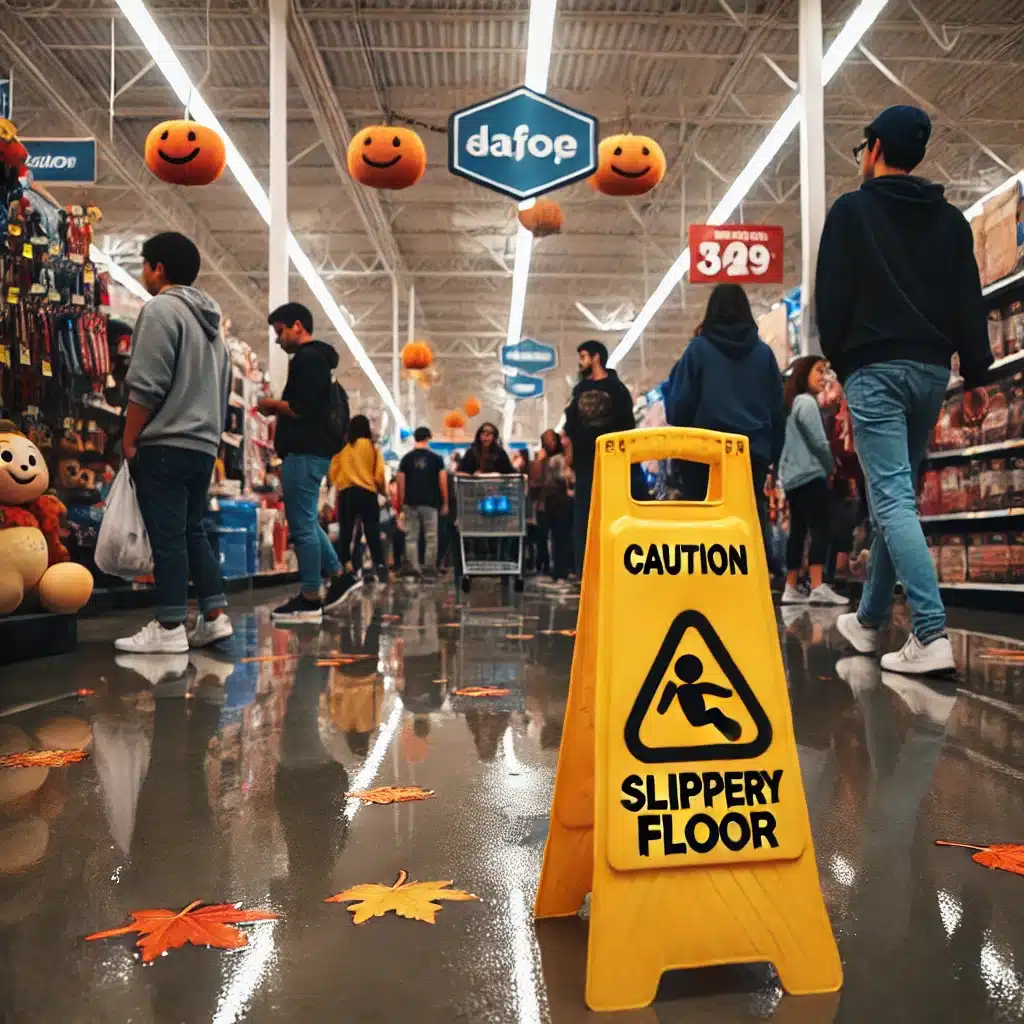As the leaves change color and the air turns crisp, retail stores gear up for one of the busiest shopping seasons of the year. Fall sales events attract hordes of eager shoppers looking for the best deals on everything from clothing to electronics. While the excitement is palpable, the increased foot traffic and bustling aisles can lead to a spike in slip and fall accidents. In Texas, understanding your rights and knowing how to stay safe can make all the difference. This comprehensive guide will walk you through the rise in retail store accidents during fall sales, how to protect yourself, and what to do if you’re injured.

The Rise of Slip and Fall Accidents During Fall Sales
Increased Foot Traffic Leads to Hazards
Fall sales events like Black Friday and Cyber Monday draw massive crowds. Retailers often extend their hours and pack their stores with merchandise to meet the demand. However, the combination of overcrowded aisles and overstocked shelves can create a perfect storm for accidents.
Common Causes of Slip and Fall Accidents
- Cluttered Aisles: Merchandise, boxes, and promotional displays can obstruct walkways.
- Wet Floors: Autumn weather brings rain, leading to wet entrances and slippery floors.
- Poor Lighting: Dimly lit areas can hide hazards like spills or uneven flooring.
- Damaged Flooring: Worn-out carpets, loose tiles, or uneven surfaces increase the risk of tripping.
Statistics Speak Volumes
According to the National Floor Safety Institute, falls account for over 8 million hospital emergency room visits annually. Retail environments see a significant uptick in these incidents during busy sales periods.
Understanding Premises Liability in Texas
What is Premises Liability?
Premises liability refers to a property owner’s legal responsibility for injuries that occur on their property due to unsafe conditions. In Texas, retailers have a duty to ensure their premises are reasonably safe for customers.
The Duty of Care Owed by Retail Stores
- Inspect Regularly: Stores must routinely check for hazards.
- Warn Customers: If a danger can’t be immediately fixed, clear warning signs must be posted.
- Fix Hazards Promptly: Any identified risks should be addressed as soon as possible.
Texas-Specific Laws and Statutes
In Texas, to successfully claim a slip and fall injury, you must prove that:
- The store had actual or constructive knowledge of the hazard.
- The condition posed an unreasonable risk of harm.
- The store did not exercise reasonable care to reduce or eliminate the risk.
- The store’s failure was the proximate cause of your injuries.
How to Stay Safe While Shopping During Sales Events
Plan Your Shopping Trip
- Shop During Off-Peak Hours: Early mornings or late evenings are less crowded.
- Wear Appropriate Footwear: Non-slip shoes can help prevent falls.
- Stay Alert: Keep an eye out for wet floors, spills, or obstacles.
Be Mindful of Your Surroundings
- Avoid Distractions: Limit phone use while walking.
- Use Handrails: When using stairs or escalators, hold onto handrails.
- Report Hazards: Notify store staff if you notice a potential danger.
Navigate Crowded Areas Carefully
- Maintain Personal Space: Give yourself room to react to sudden stops or obstacles.
- Follow Store Signage: Pay attention to directional signs or warnings.
What to Do If You’re Injured in a Store
Immediate Steps to Take After an Accident
- Seek Medical Attention: Your health is the top priority.
- Report the Incident: Inform store management and ensure an incident report is filed.
- Document Everything: Take photos of the scene, your injuries, and any hazards.
- Collect Witness Information: Get contact details from anyone who saw the accident.
Preserve Evidence
- Keep Clothing and Shoes: They may serve as evidence.
- Save Medical Records: Document all treatments and expenses.
Avoid Giving Statements
- Limit Communication: Do not provide detailed statements to store representatives or insurance adjusters without legal counsel.
Filing a Slip and Fall Claim in Texas
Legal Considerations
- Statute of Limitations: In Texas, you have two years from the date of the accident to file a personal injury lawsuit.
- Comparative Negligence: Texas follows a modified comparative negligence rule. If you are found to be more than 50% at fault, you cannot recover damages.
Proving Negligence
To establish liability, you must demonstrate that the store knew or should have known about the hazardous condition and failed to address it adequately.
Potential Compensation
- Medical Expenses: Coverage for current and future medical bills.
- Lost Wages: Compensation for time off work.
- Pain and Suffering: Monetary value assigned to physical and emotional distress.
How Ryan Orsatti Law Can Help
Expertise in Slip and Fall Cases
At Ryan Orsatti Law, we specialize in personal injury cases, including slip and fall accidents in retail settings. Our deep understanding of Texas premises liability law enables us to build strong cases for our clients.
Personalized Legal Support
- Free Consultations: We’ll evaluate your case at no cost.
- No Upfront Fees: You pay nothing unless we win your case.
- Dedicated Representation: We handle all communications with insurance companies and opposing counsel.
Contact Us Today
Conclusion
Fall sales events offer great deals but also come with increased risks of slip and fall accidents. Being vigilant and knowing your rights can help you stay safe and protect your interests. If you or a loved one has been injured in a retail store, understanding Texas premises liability laws is crucial for securing the compensation you deserve.
At Ryan Orsatti Law, we’re committed to helping you navigate the legal process with confidence. Contact us today for a free consultation and let us advocate for your rights.

